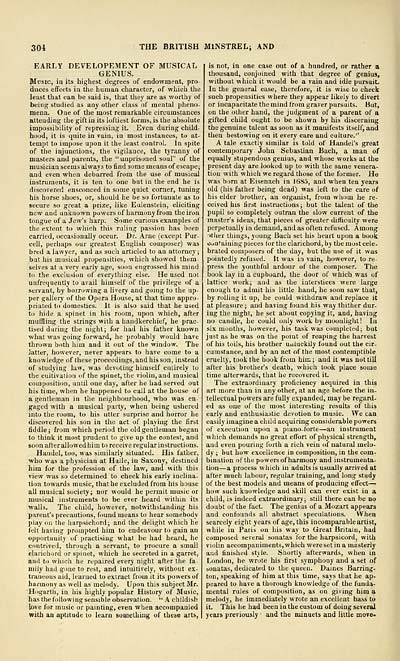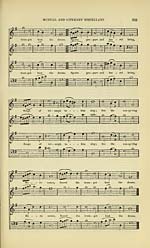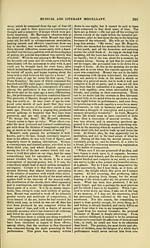Glen Collection of printed music > Printed music > British minstrel, and musical and literary miscellany
(312) Page 304
Download files
Complete book:
Individual page:
Thumbnail gallery: Grid view | List view

304
THE BRITISH MINSTREL; AND
EARLY DEVELOPEMENT OF MUSICAL
GENIUS.
Mdsio, in its highest degrees of endowment, pro.
duces effects in the human character, of which the
least that can be said is, that they are as worthy of
being studied as any other class of mental pheno-
mena. One of the most remarkable circumstances
attending the gift in its loftiest forms, is the absolute
impossibility of repressing it. Even during child-
hood, it is quite in vain, in most instances, to at-
tempt to impose upon it the least control. In spite
of the injunctions, the vigilance, the tyranny of
masters and parents, the " unprisoned soul" of the
musician seems always to find some means of escape;
and even when debarred from the use of musical
instruments, it is ten to one but in the end he is
discovered ensconced in some quiet corner, tuning
his horse shoes, or, should he be so fortunate as to
secure so great a prize, like Eulenstein, eliciting
new and unknown powers of harmony from the iron
tongue of a Jew's harp. Some curious examples of
the extent to which this ruling passion has been
carried, occasionally occur. Dr. Arne (except Pur-
cell, perhaps our greatest English composer) was
bred a lawyer, and as such articled to an attorney ;
but his musical propensities, which showed them-
selves at a very early age, soon engrossed his mind
to the exclusion of everything else. He used not
unfrequently to avail himself of the privilege of a
servant, by borrowing a livery and going to the up-
per gallery of the Opera House, at that time appro-
priated to domestics. It is also said that he used
to hide a spinet in his room, upon which, after
muffling the strings with a handkerchief, he prac-
tised during the night; for had his father known
what was going forward, he probably would have
thrown both him and it out of the window. The
Matter, however, never appears to have come to a
knowledge of these proceedings, and his son, instead
of studying law, was devoting himself entirely to
the cultivation of the spinet, the violin, and musical
composition, until one day, after he had served out
his time, when he happened to call at the house of
a gentleman in the neighbourhood, who was en-
gaged with a musical party, when being ushered
into the room, to his utter surprise and horror he
<liscovered his son in the act of playing the first
fiddle; from which period the old gentleman began
to think it most prudent to give up the contest, and
soon after allowed him to receive regular instructions.
Handel, too, was similarly situated. His father,
who was a physician at Halle, in Saxony, destined
him for the profession of the law, and with this
view was so determined to check his early inclina-
tion towards music, that he excluded from his house
all musical society; nor would he permit music or
musical instruments to be ever heard within its
walls. The child, however, notwithstanding his
parent's precautions, found means to hear somebody
play on the harpsichord; and the delight which he
ielt having prompted him to endeavour to gain an
opportunity of practising what be had heard, he
contrived, through a servant, to procure a small
clarichord or spinet, which he secreted in a garret,
and to which he repaired every night after the fa-
mily had gone to rest, and intuitively, without ex-
traneous aid, learned to extract from it its powers of
harmony as well a.9 melody. Upon this subject Mr.
Hogarth, in his highly popular History of Music,
has the following sensible observation. '• A childish
love for music or painting, even when accompanied
with an aptitude to learn something of these arts,
is not, in one case out of a hundred, or rather a
thousand, conjoined with that degree of genius,
without which it would be a vain and idle pursuit.
In the general case, therefore, it is wise to check
such propensities where they appear likely to divert
or incapacitate the mind from graver pursuits. But,
on the other hand, the judgment of a parent of a
gifted child ought to be shown by his discerning
the genuine talent as soon as it manifests itself, and
then bestowing on it every care and culture."
A tale exactly similar is told of Handel's great
contemporary John Sebastian Bach, a man of
equally stupendous genius, and whose works at the
present day are looked up to with the same venera-
tion with which we regard those of the former. He
was born at Eisenach in 1685, and when ten years
old (his father being dead) was left to the care of
his elder brother, an organist, from whom he re-
ceived his first instructions ; but the talent of the
pupil so completely outran the slow current of the
master's ideas, that pieces of greater ditiiculty were
perpetually in demand, and as often refused. Among
itlier things, young Bach set his heart upon a book
ouotaining pieces for the clarichord, by the most cele.
brated composers of the day, but the use of it was
pointedly refused. It was in vain, however, to re-
press the youthful ardour of the composer. The
book lay in a cupboard, the door of which was of
lattice work; and as the interstices were large
enough to admit his little hand, he soon saw that,
by rolling it up, he could withdraw and replace it
at pleasure ; and having found his way thither dur-
ing the night, he set about copying it, and, having
no candle, he could only work by moonlight! In
six months, however, his task was completed; but
just as he was on the point of reaping the harvest
of his toils, his brother unluckily found out the cir-
cumstance, and by an act of the most contemptible
cruelty, took the book from him ; and it was not till
after his brother's death, which took place some
time afterwards, that he recovered it.
The extraordinary proficiency acquired in this
art more than in any other, at an age before the in-
tellectual powers are fully expanded, may be regard-
ed as one of the most interesting results of this
early and enthusiastic devotion to music. We can
easily imagine a child acquiring considerable powers
of execution upon a piano-forte — an instrument
which demands no great efl'ort of physical strength,
and even pouring forth a rich vein of natural melo-
dy ; but how excellence in composition, in the com-
bination of the powers of harmony and instrumenta-
tion — a process which in adults is usually arrived at
after much labour, regular training, and long study
of the best models and means of producing effect —
how such knowledge and skill can ever exist in a
child, is indeed extraordinary; still there can be no
doubt of the fact. The genius of a Mozart appears
and confounds all abstract speculations. When
scarcely eight years of age, this incomparable artist,
while in Paris on his way to Great Britain, had
composed several sonatas for the harpsicord, with
violin accompaniments, which were set in a masterly
and finished style. Shortly afterwards, when in
London, he wrote his first symphony and a set of
sonatas, dedicated to the queen. Daines Barring-
ton, speaking of him at this time, says that he ap-
peared to have a thorough knowledge of the funda-
mental rules of composition, as on giving him ^
melody, he immediately wrote an excellent bass to
it. This he had been in the custom of doing several
years previously ' and the minuets and little move-
THE BRITISH MINSTREL; AND
EARLY DEVELOPEMENT OF MUSICAL
GENIUS.
Mdsio, in its highest degrees of endowment, pro.
duces effects in the human character, of which the
least that can be said is, that they are as worthy of
being studied as any other class of mental pheno-
mena. One of the most remarkable circumstances
attending the gift in its loftiest forms, is the absolute
impossibility of repressing it. Even during child-
hood, it is quite in vain, in most instances, to at-
tempt to impose upon it the least control. In spite
of the injunctions, the vigilance, the tyranny of
masters and parents, the " unprisoned soul" of the
musician seems always to find some means of escape;
and even when debarred from the use of musical
instruments, it is ten to one but in the end he is
discovered ensconced in some quiet corner, tuning
his horse shoes, or, should he be so fortunate as to
secure so great a prize, like Eulenstein, eliciting
new and unknown powers of harmony from the iron
tongue of a Jew's harp. Some curious examples of
the extent to which this ruling passion has been
carried, occasionally occur. Dr. Arne (except Pur-
cell, perhaps our greatest English composer) was
bred a lawyer, and as such articled to an attorney ;
but his musical propensities, which showed them-
selves at a very early age, soon engrossed his mind
to the exclusion of everything else. He used not
unfrequently to avail himself of the privilege of a
servant, by borrowing a livery and going to the up-
per gallery of the Opera House, at that time appro-
priated to domestics. It is also said that he used
to hide a spinet in his room, upon which, after
muffling the strings with a handkerchief, he prac-
tised during the night; for had his father known
what was going forward, he probably would have
thrown both him and it out of the window. The
Matter, however, never appears to have come to a
knowledge of these proceedings, and his son, instead
of studying law, was devoting himself entirely to
the cultivation of the spinet, the violin, and musical
composition, until one day, after he had served out
his time, when he happened to call at the house of
a gentleman in the neighbourhood, who was en-
gaged with a musical party, when being ushered
into the room, to his utter surprise and horror he
<liscovered his son in the act of playing the first
fiddle; from which period the old gentleman began
to think it most prudent to give up the contest, and
soon after allowed him to receive regular instructions.
Handel, too, was similarly situated. His father,
who was a physician at Halle, in Saxony, destined
him for the profession of the law, and with this
view was so determined to check his early inclina-
tion towards music, that he excluded from his house
all musical society; nor would he permit music or
musical instruments to be ever heard within its
walls. The child, however, notwithstanding his
parent's precautions, found means to hear somebody
play on the harpsichord; and the delight which he
ielt having prompted him to endeavour to gain an
opportunity of practising what be had heard, he
contrived, through a servant, to procure a small
clarichord or spinet, which he secreted in a garret,
and to which he repaired every night after the fa-
mily had gone to rest, and intuitively, without ex-
traneous aid, learned to extract from it its powers of
harmony as well a.9 melody. Upon this subject Mr.
Hogarth, in his highly popular History of Music,
has the following sensible observation. '• A childish
love for music or painting, even when accompanied
with an aptitude to learn something of these arts,
is not, in one case out of a hundred, or rather a
thousand, conjoined with that degree of genius,
without which it would be a vain and idle pursuit.
In the general case, therefore, it is wise to check
such propensities where they appear likely to divert
or incapacitate the mind from graver pursuits. But,
on the other hand, the judgment of a parent of a
gifted child ought to be shown by his discerning
the genuine talent as soon as it manifests itself, and
then bestowing on it every care and culture."
A tale exactly similar is told of Handel's great
contemporary John Sebastian Bach, a man of
equally stupendous genius, and whose works at the
present day are looked up to with the same venera-
tion with which we regard those of the former. He
was born at Eisenach in 1685, and when ten years
old (his father being dead) was left to the care of
his elder brother, an organist, from whom he re-
ceived his first instructions ; but the talent of the
pupil so completely outran the slow current of the
master's ideas, that pieces of greater ditiiculty were
perpetually in demand, and as often refused. Among
itlier things, young Bach set his heart upon a book
ouotaining pieces for the clarichord, by the most cele.
brated composers of the day, but the use of it was
pointedly refused. It was in vain, however, to re-
press the youthful ardour of the composer. The
book lay in a cupboard, the door of which was of
lattice work; and as the interstices were large
enough to admit his little hand, he soon saw that,
by rolling it up, he could withdraw and replace it
at pleasure ; and having found his way thither dur-
ing the night, he set about copying it, and, having
no candle, he could only work by moonlight! In
six months, however, his task was completed; but
just as he was on the point of reaping the harvest
of his toils, his brother unluckily found out the cir-
cumstance, and by an act of the most contemptible
cruelty, took the book from him ; and it was not till
after his brother's death, which took place some
time afterwards, that he recovered it.
The extraordinary proficiency acquired in this
art more than in any other, at an age before the in-
tellectual powers are fully expanded, may be regard-
ed as one of the most interesting results of this
early and enthusiastic devotion to music. We can
easily imagine a child acquiring considerable powers
of execution upon a piano-forte — an instrument
which demands no great efl'ort of physical strength,
and even pouring forth a rich vein of natural melo-
dy ; but how excellence in composition, in the com-
bination of the powers of harmony and instrumenta-
tion — a process which in adults is usually arrived at
after much labour, regular training, and long study
of the best models and means of producing effect —
how such knowledge and skill can ever exist in a
child, is indeed extraordinary; still there can be no
doubt of the fact. The genius of a Mozart appears
and confounds all abstract speculations. When
scarcely eight years of age, this incomparable artist,
while in Paris on his way to Great Britain, had
composed several sonatas for the harpsicord, with
violin accompaniments, which were set in a masterly
and finished style. Shortly afterwards, when in
London, he wrote his first symphony and a set of
sonatas, dedicated to the queen. Daines Barring-
ton, speaking of him at this time, says that he ap-
peared to have a thorough knowledge of the funda-
mental rules of composition, as on giving him ^
melody, he immediately wrote an excellent bass to
it. This he had been in the custom of doing several
years previously ' and the minuets and little move-
Set display mode to: Large image | Transcription
Images and transcriptions on this page, including medium image downloads, may be used under the Creative Commons Attribution 4.0 International Licence unless otherwise stated. ![]()
| Special collections of printed music > Glen Collection of printed music > Printed music > British minstrel, and musical and literary miscellany > (312) Page 304 |
|---|
| Permanent URL | https://digital.nls.uk/91438689 |
|---|
| Description | Scottish songs and music of the 18th and early 19th centuries, including music for the Highland bagpipe. These are selected items from the collection of John Glen (1833 to 1904). Also includes a few manuscripts, some treatises, and other books on the subject. |
|---|
| Description | The Glen Collection and the Inglis Collection represent mainly 18th and 19th century Scottish music, including Scottish songs. The collections of Berlioz and Verdi collected by bibliographer Cecil Hopkinson contain contemporary and later editions of the works of the two composers Berlioz and Verdi. |
|---|

